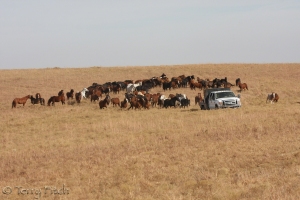Wild horses being brought to Oklahoma
The government is spending your money — millions — to protect wild horses and bring them to Oklahoma.
But it’s how those horses got here that’s causing concern.
Horses you can see as you drive along the Creek Turnpike, just east of Tulsa are wild horses.
The federal government pays ranchers in Oklahoma to take care of them.
The Bureau of Land Management runs the program and gathers horses and burros in western states. Western Wild Horses Shipped to Oklahoma
http://www.fox23.com/news/local/story/Wild-horses-being-brought-to-Oklahoma/WnitYlg4OUqWgAiB6BmfAQ.cspx
Reported by: Janna Clark for Fox23.com
“It’s tragic. So many animals killed. Babies vanish…”
Former Wild Horses at feeding time in private long term holding facility outside Oklahoma City ~ photo by Terry Fitch of Wild Horse Freedom Federation
The government is spending your money — millions — to protect wild horses and bring them to Oklahoma.
But it’s how those horses got here that’s causing concern.
Horses you can see as you drive along the Creek Turnpike, just east of Tulsa are wild horses.
The federal government pays ranchers in Oklahoma to take care of them.
The Bureau of Land Management runs the program and gathers horses and burros in western states.
Horse owner Pam Smith says the way crews gather the animals with helicopters is cruel.
“Imagine the heat we have today. Multiply that in the desert. Horses of all ages run for two hours. Babies that run, they die of exhaustion,” Smith said.
Smith says horses are herd animals, and she doesn’t agree with the BLM’s way of separating them.
“They’re families. You’re taking moms away from babies, sisters from sisters, and dads away from them,” Smith said.
She pointed out videos she’s seen on the Internet that show a separated foal calling for its mother and one that shows confused horses trampling each other. Another shows a horse that’s so tired it can’t get up. And in another, a foal can barely walk.
“It’s tragic. So many animals killed. Babies vanish,” Smith said.
In another video Smith showed FOX23, a helicopter hits a horse. In another, a chopper knocks down a burro, and a man hits and later kicks a captured one.
“It’s horrific what they do to these horses,” Smith said.
“I’ve seen the dramatized videos that are out there on the Internet,” said the BLM’s Paul McGuire.
“Many opinions out there are driven by emotion,” McGuire said.
He says the horses are not mistreated.
“I’ve seen actual gather operations. I’m impressed by the professionalism,” he said.
“Horses are very adaptable animals … It’s going to respond very quickly and very readily to its new environment,” McGuire said.
Smith thinks the BLM should just leave the horses alone on federal land.
“Horses are an American icon, they need to run free … Let nature take its course,” Smith said.
But McGuire says that’s not a good idea, that horses double in population every four years, and they would destroy the land.
“Eat it and trample it into desolation. Once its trod under, it may never recover … It’s not something the American people want to see,” McGuire said.
Smith says she’s also concerned about the BLM selling horses to kill buyers who slaughter them for the meat. McGuire admits the BLM has concerns about that too. So earlier this year, it changed its policy. Now it will only sell four horses at a time to try to prevent that from happening.
Jay Litchfield also owns horses. He’s concerned about the cost of the government program.
“I don’t know why we’re collecting wild horses. truly don’t know why,” Litchfield said.
Congress decided 1971 to protect the wild horses. The government’s doled out millions, so the BLM can manage them.
Once the government gathers the horses, if it can’t adopt or sell them, the BLM moves them to private pastures. The government pays ranchers to keep them.
Back on June 11, FOX23 emailed an open records request to the BLM to find out who keeps the horses and where.
The BLM emailed FOX23 a list of 21 ranchers that have contracts with the government. More than half — 13 of them — are in Oklahoma.
FOX23 stopped at land in Catoosa, where the owner leases 10,000 acres to Hughes Cattle Company in Bartlesville. The Hughes tell FOX23 they have a contract with the BLM to hold about 4,000 horses in Catoosa, Bartlesville and Ramona.
The Hughes wouldn’t tell FOX23 how much money the government pays them, saying the BLM asked them not to but the family did say they’ve had a contract for 25 years.
The BLM says it pays $500 per horse per year. That means it pays Hughes Cattle Company more than $2 million per year.
Overall, the BLM spends more than $75 million in tax dollars each year on the program. More than half — $40 million — goes to contracted ranchers.
Litchfield says a horse can live up to 30 years. So to save one horse, could cost tax payers $15,000.
“I don’t understand why we’d spend that much money on them,” Litchfield said.
The National Academy of Science audited the BLM and criticized it, saying the rising costs continue to overwhelm the program and that more than 49,000 horses are kept in private pastures with considerably fewer — 31,000 — left in the wild.
Litchfield believes he has the answer to save millions. He says the government shouldn’t gather horses and pay ranchers to keep them. He says leave them on federal land and figure out how to maintain the population.
“You can put them down. I hate to say that. But you have unwanted horses. Why are we doing it?” Litchfield suggested.
McGuire says although Congress authorized putting down excess horses, it doesn’t provide the funding for it and that maintaining the population is difficult.
“There is no simple answer,” McGuire said.
“When are they going to wake up … We’re spending a lot of money to keep horses nobody wants,” Litchfield said.
McGuire says part of the reason the number of wild horses in private pastures is rising is because adoptions have been down for the past decade.
The BLM is holding an event where you can come look at horses up for adoption. It’s at the Claremore Expo Center on Aug. 16 and 17.


